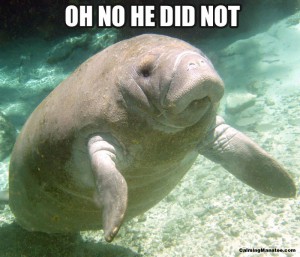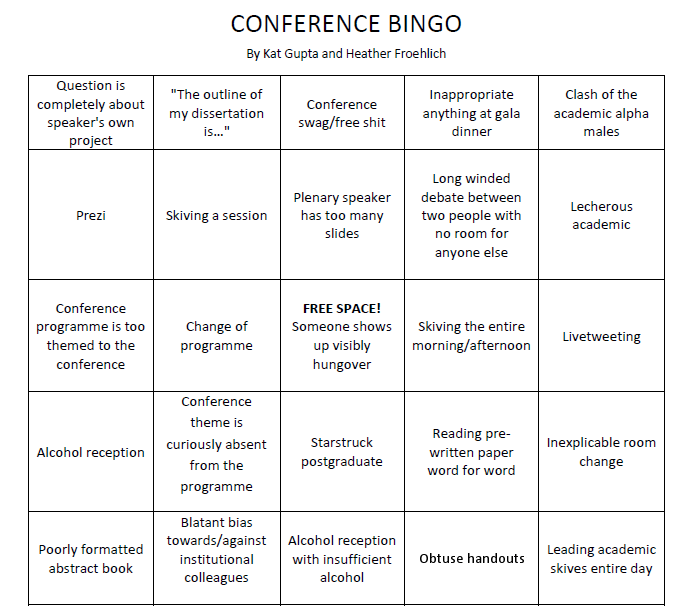I went to a conference 18 months ago where nearly everything that could go wrong went wrong. I stayed with the excellent Heather Froehlich afterwards, and as we talked about our crappy conference adventures we noted that a lot of these things were not isolated events.
Conference Bingo mingles the humorous with a sharper edge. A good proportion of the items are there out of affection – I’ve certainly been both the starstruck postgraduate and the postgraduate frantically working (sometimes at the same time). I think (and hope) that most of these items provoke a chuckle of wry recognition as we recognise ourselves in them. Some of the squares are there because Heather and I find these things funny or ridiculous. I personally love witnessing “clash of the academic alpha males” because I can start an internal David Attenborough style narration to accompany them (“and here, two silverback males find themselves in unexpected confrontation…”). You will find me in the middle of any unseemly jostling for a power socket. Weird things happen to me at conferences. Here are a few of them: the time I ended up in a motel laundry room, with several prominent academics, in the dark, because there was a tornado outside. The accidental lock-in. The time I had to persuade an academic that stroking a very angry looking man’s tattoo in the pub would be a Very Bad Idea and then having to persuade the very angry looking man not to punch the academic. The time a rabbit died on me.
However, some of the bingo items have an edge to them, a recognition that conferences are not always safe or accessible spaces for everyone. We have items critiquing gendered interactions, poor accessibility for attendees with disabilities, and issues faced by international attendees. I hope we get a nod of recognition from people with those experiences, and hope that they feel their experiences are acknowledged and recognised. I believe, passionately, that we have our places in academia and just as much right as anyone else to be there. If we cannot get into the venue and/or find ourselves planning which sessions to attend based on our harasser’s movements and/or are left anxious and miserable and isolated, that is not our fault.
We also hope to make people who don’t share those experiences more aware of them through simply noticing that they’re an issue. Food not clearly labelled as vegan/vegetarian or with common allergens? Slides that prompt a “sorry if you can’t see this at the back”? Okay, it may not affect you but it’s a box to tick off! We hope that, through humour, we’re quietly raising awareness of some of these issues. I hope that some of these items will make you think about the implications for other people. Last minute programme changes are probably frustrating for most of us, but can (for example) mean that those with fatigue issues or who use mobility devices have to suddenly replan how – and, indeed, if – they can get from different parts of the building/campus.
Those of us who experience these things may not be in a position to criticise them. As early career researchers who, between us, are female, queer, non-white, and non-binary gendered, neither Heather or I are necessarily in a position to kick up a fuss. There are many people in similar positions: young, female, queer, Black, disabled, transgender, and/or without tenure or a permanent job, people who don’t have institutional might behind them and who fear ostracisation if they complain.
Speaking from my own experience, I’ve had to ask trusted friends to keep an eye on me and swoop in if “my” lecherous academic manages to get me on my own. I should probably complain to someone, but it’s hard to make complaints against widely respected senior members of your field when there can be repercussions against you for complaining. Dorothy Kim writes that part of the problem is that this isn’t seen as something the entire community should be aware of, but it’s framed as an issue between individuals: individual harassers, individual complaints. I hope that in some tiny way, Conference Bingo might contribute to that community awareness.Maybe you’ll use Conference Bingo as a checklist of things to not do in your talks or at the conferences you organise. I suspect it’s helped me become a better presenter. I no longer tell people that I’ve only just finished my slides (even if I have) and I have a much better idea of how much I can cover in 20 minutes so I’m not racing through the last few slides. I know it’s been immensely helpful for me when organising academic events – make it easy to access wifi! spell people’s names correctly on their nametag! people WILL remember your event for all the wrong reasons if your provide terrible coffee!
However, one of my favourite things is when people suggest things and I get to think about them. As an example, Liz C’s comment of “Social evening inexplicably at opposite end of the city” – I suspect most people would probably find that annoying. But what happens if you have an anxiety issue that means that navigating a different city’s public transport is daunting at best, terrifying at worst? What if you can’t afford to take a taxi? What if you’re sleeping on a friend’s sofa because you can’t afford hotel accommodation and going to the other end of the city means you’ll be back unreasonably late? What if you use mobility aids or have an assistance dog and aren’t sure if the city’s public transport or taxis will cater for you? This has been especially helpful when I don’t share those needs, and, I hope, makes my involvement in academia a bit more thoughtful, a bit more welcoming, a bit kinder. Maybe Conference Bingo will inspire you, too, to dig deeper.
Either way, I love that Conference Bingo resonates with so many people from so many disciplines. I love hearing suggestions. I love that it’s gone a bit viral. I genuinely love it when people tweet me (@mixosaurus) to tell me they’re playing or have got a full house so please let me know!


